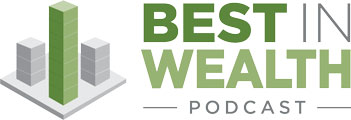Will the Coronavirus Outbreak Affect my Investments? Ep #139

The coronavirus is making waves around the world, inciting fear in its wake. But what will it’s true impact be on a global scale? Will it affect my investment portfolio? In this episode of Best in Wealth, my goal is to quell your fears. I’ll talk about recency bias, how past pandemics affected the stock market, and what to expect from the coronavirus.
So what is the coronavirus? The official name is COVID-19. According to the CDC, current symptoms include mild to severe respiratory illness with fever, cough, and difficulty breathing. The virus originated from an animal (similar to MERS and SARS) but can be transmitted by human-to-human contact.
Will the Coronavirus Affect my Investments? I share my thoughts on the pandemic In this episode of Best in Wealth! #wealth #retirement #investing #PersonalFinance #FinancialPlanning #RetirementPlanning #WealthManagement Click To TweetOutline of This Episode
- [1:59] The topic of the day: coronavirus and your investments
- [2:05] What do you do when your kids get hurt?
- [3:37] How will the coronavirus affect my investments?
- [6:14] Current global toll from the coronavirus (Feb. 27th)
- [7:54] SARS impact on the stock market and global economy
- [9:20] The impact the Bird Flu had—lethal but short-lived
- [10:21] The Swine Flu was the most widespread pandemic
- [12:09] Put the current pandemic in the proper perspective
- [12:49] The impact of Ebola and the Pneumonic Plague
- [13:14] The market will recover quickly based on past trends
- [14:54] What happens next?
- [17:17] What do we do with our investments?
You must overcome recency bias
Recency bias is a simple construct: you remember clearly what’s happened most recently, compared to something that has happened in the near past. With every new virus that becomes widespread, we forget the impact of those that have come previously. Human instinct—and certainly that of the media—is to revert to panic.
I’ve done extensive research this week to gain information about pandemics that have struck within the last twenty years to see what the recent past tells us. Outbreaks come and go, but we need to be sure to educate ourselves and be prepared for the potential outcomes.
How global pandemics of the past impacted the stock market
I’ve narrowed down and gathered some statistics on a few outbreaks and how they impacted the global economy:
- Severe Acute Respiratory Syndrome (SARS): Sars began to spread in early 2003 with an outbreak concentrated in Asia. It reduced the global GDP by 33 billion dollars. The first month after it broke the market was up 86%. After 6 months, the market was still up 21.5%.
- The bird flu: In 2016, the bird flu affected fewer people but had a higher death toll, which was quite scary. While lethal, the epidemic was short-lived. After one month the market was flat, but 6 months later the market was up 10%.
- The swine flu: The CDC announced the spread of the swine flu in 2009. It originated in Mexico and could not be contained. It became so widespread that President Obama declared a public health emergency. Between 700 million and 1.5 billion people contracted the swine flu with close to half a million deaths. Despite everything, the market was up 11% a month into the epidemic and was up 40% after 6 months.
Keep listening as I share a few more statistics on widespread viruses. But the long-term impact of nearly all of them was a rebounding market.
In this episode of Best in Wealth, I share how global pandemics of the past impacted the stock market—and what we could expect from the coronavirus. Don’t miss it! #wealth #retirement #investing #PersonalFinance #FinancialPlanning… Click To TweetPut the Coronavirus in proper perspective
In light of our tendency towards recency bias and the impact of past pandemics, it’s important to put the coronavirus in the proper perspective. Currently, as of Feb. 27th, Covid-19 has affected 82,550 people worldwide and 2,810 people have died. While it is still scary, it pales in comparison to past pandemics.
Every time a pandemic hits we are in different stages of the economy—expansion, recession, a bear market, etc. Right now, we’ve hit a correction territory, which on average happens once a year. The market has dropped by about 10% since the end of December. But from my experience, the quicker it drops, the faster it snaps back.
Perhaps the virus will have greater consequences on the global economy than anticipated. We don’t know where the pandemic is headed or what will happen next. But if it follows the trends of the past, confirmed cases will rise sharply for 8-10 weeks and the infection will taper off come spring. The coming weeks will be horrible—but the market will recover.
The all-consuming question: What do I do with my investments?
It’s possible that the coronavirus could trigger a recession in the global economy. But the economy could already have been vulnerable. There is no real way to know the impact. So what happens next for your investments?
Do not panic. A short-term pandemic doesn’t equal changing your long-term investments. If you’re investing the right way from the beginning a downturn doesn’t affect your portfolio. The right asset classes will still produce your monthly check. Don’t make emotional decisions based on fear. The markets will recover. So stay calm, carry on—and wash your hands.
To prevent the spread of germs: wash your hands frequently, cover your mouth when you cough, eat well, get adequate sleep, and exercise. Avoid health risks by practicing good hygiene.
In this episode of Best in Wealth I answer the all-consuming question about the coronavirus pandemic: What do I do with my investments? Listen now! #wealth #retirement #investing #PersonalFinance #FinancialPlanning #RetirementPlanning… Click To TweetResources & People Mentioned
- Annie Nova’s Article on the Coronavirus
- Jeffrey Kleintop’s Market Commentary
- Mark DeCambre’s article on the stock market
- You, Your Investments, and the Coronavirus by Rick Raybin
- The CDC on the COVID-19 “Coronavirus”
Connect With Scott Wellens
- Schedule a discovery call with Scott
- Send a message to Scott
- Visit Fortress Planning Group
- Connect with Scott on LinkedIn
- Follow Scott on Twitter
- Fortress Planning Group on Facebook
Podcast Disclaimer:
The Best In Wealth Podcast is hosted by Scott Wellens. Scott Wellens is the principal at Fortress Planning Group. Fortress Planning Group is a registered investment advisory firm regulated by the Securities Act of Wisconsin in accordance and compliance with securities laws and regulations. Fortress Planning Group does not render or offer to render personalized investment or tax advice through the Best In Wealth Podcast. The information provided is for informational purposes only and does not constitute financial, tax, investment or legal advice.



